That Hoarder: Overcome Compulsive Hoarding
Hoarding disorder is stigmatised and people who hoard feel vast amounts of shame. This podcast began life as an audio diary, an anonymous outlet for somebody with this weird condition. That Hoarder speaks about her experiences living with compulsive hoarding, she interviews therapists, academics, researchers, children of hoarders, professional organisers and influencers, and she shares insight and tips for others with the problem. Listened to by people who hoard as well as those who love them and those who work with them, Overcome Compulsive Hoarding with That Hoarder aims to shatter the stigma, share the truth and speak openly and honestly to improve lives.
Episodes

Friday Aug 15, 2025
Friday Aug 15, 2025
"Really early on, I was like, this isn't about the stuff. This just isn't about the stuff." - Tracy McCubbin.
Today, we’re revisiting this episode with podcast favourite Tracy McCubbin, about being the child of a hoarder and becoming a professional organiser.
Find the full show notes and transcript here: https://www.overcomecompulsivehoarding.co.uk/podcast-ep-78-from-child-of-a-hoarder-to-professional-organiser-an-interview-with-tracy-mccubbin/
Come to a Dehoarding Accountability Zoom Session: http://www.overcomecompulsivehoarding.co.uk/ticket
Subscribe to the podcast: https://www.overcomecompulsivehoarding.co.uk/subscribe
Podcast show notes, links and transcript: http://www.overcomecompulsivehoarding.co.uk/

Friday Aug 08, 2025
Friday Aug 08, 2025
Come to a Dehoarding Accountability Zoom Session: http://www.overcomecompulsivehoarding.co.uk/ticket
Subscribe to the podcast: https://www.overcomecompulsivehoarding.co.uk/subscribe
Podcast show notes, links and transcript: http://www.overcomecompulsivehoarding.co.uk/
Today, we’re revisiting this episode with the inimitable Dr Jan Eppingstall about how grief, bereavement and loss are often knitted into hoarding disorder.
Find the full show notes and transcript here: https://www.overcomecompulsivehoarding.co.uk/podcast-ep-63-grief-and-loss-and-hoarding-with-dr-jan-eppingstall-of-stuffology/

Friday Aug 01, 2025
Friday Aug 01, 2025
Come to a Dehoarding Accountability Zoom Session: http://www.overcomecompulsivehoarding.co.uk/ticket
Subscribe to the podcast: https://www.overcomecompulsivehoarding.co.uk/subscribe
Podcast show notes, links and transcript: http://www.overcomecompulsivehoarding.co.uk/
Today, we're revisiting this episode with the wonderful Jo Cooke from Hoarding Disorders UK about chronic disorganisation, what it has in common with hoarding, and how it differs. Find the full show notes and transcript here: https://www.overcomecompulsivehoarding.co.uk/podcast-ep-139-chronic-disorganisation-with-jo-cooke-of-hoarding-disorders-uk/

Friday Jul 25, 2025
Friday Jul 25, 2025
Come to a Dehoarding Accountability Zoom Session: http://www.overcomecompulsivehoarding.co.uk/ticket
Subscribe to the podcast: https://www.overcomecompulsivehoarding.co.uk/subscribe
Podcast show notes, links and transcript: http://www.overcomecompulsivehoarding.co.uk/
Why is it so hard to deal with uncertainty, and what does that have to do with hoarding? This week I’m joined by Dr Jan Eppingstall to unpack how our brains handle ambiguity, why fear of making mistakes can keep us stuck, and how intolerance of uncertainty feeds into hoarding behaviours. We break down practical ways to build up your tolerance for not knowing and share some strategies that might actually make a difference.
Uncertainty and Its Challenges
Definition and context of uncertainty
Evolutionary reasons for discomfort with uncertainty (Selfish Brain Theory)
Contrast between historical resource scarcity and modern abundance
Our minds’ outdated ways of managing uncertainty
Cognitive Closure
What is cognitive closure?
Difference between cognitive closure (psychological need for definite answers) and “closure” in pop culture (emotional resolution)
How it relates to need for certainty in present/future, not just past events
The creation of cognitive closure measurement scales by researchers
Factors influencing need for cognitive closure:
Personality traits: Conscientiousness, neuroticism (now called emotionality), openness to experience, extroversion
Trauma history and its effects on the nervous system
Neurodivergence (with emphasis on autism and “sticky thinking”)
Combination of personality, trauma, and neurodivergence
Intolerance of Uncertainty
Psychological definition of intolerance of uncertainty
Negative cognitive bias: How it affects perception and response
Manifestations in people experiencing uncertainty as distress
Its direct relevance to hoarding behaviours
The Link Between Hoarding Disorder and Intolerance of Uncertainty
Research findings: intolerance of uncertainty as a predictor of hoarding symptom severity
Usefulness in early intervention strategies
intolerance of uncertainty as a transdiagnostic factor (across anxiety, some depression, and other mental health conditions)
How heightened anxiety sensitivity in hoarding perpetuates avoidance
Experiential avoidance in hoarding (saving and acquiring behaviours)
Connection between maladaptive behaviours and intolerance of uncertainty
Fear of Making Mistakes and Perfectionism
Common fears of mistakes in hoarding (disposing, acquiring, putting things away)
Perfectionism’s role (fear of failure, not wasting)
All-or-nothing thinking and rigid decision-making rules
Paralysing effect of avoidance due to fear of mistakes
Not making a decision as a potential mistake itself
Interaction and reinforcement between perfectionism and intolerance of uncertainty
Comorbidity and Severity
Research on multiple diagnoses: More than half of psychiatric patients have more than one diagnosis
Diagnostic challenges and overlapping criteria
How comorbidity compounds issues: More symptoms and more complexity
Higher intolerance of uncertainty linked with more severe hoarding, especially when other conditions are present
Impact on treatment difficulty
intolerance of uncertainty’s Impact on Acquiring and Discarding Behaviours
How acquiring reduces fear of missing out and future needs
Difficulty discarding as protection against future regret
Shame around mistake-making
Common inner questions: Future use, responsibility, relationships
More complexity leading to more avoidance
Nuances in intolerance of uncertainty and Hoarding
Study on sub-factors of uncertainty:
Factor 1: Negative self-referential implications (linked to hoarding severity)
Factor 2: Perception of uncertainty as unfair (not linked)
Internal vs. external perspectives on uncertainty
Relevance of anxiety-driven self-criticism
Changing Relationship to Uncertainty: Curiosity and Reframing
Rilke’s quote on “loving the questions”
Transforming approach from fear to curiosity
Curiosity as a therapeutic tool
Creativity in imagining alternatives and solutions
Relevance of loss aversion and cognitive biases
Modern Life and Uncertainty Intolerance
Research linking increased use of technology (instant answers) to rising intolerance of uncertainty
Smartphone/information overload and decreased tolerance “muscle”
Relevance to hoarding (desire for backups, information saving)
Example: IMDb, screenshots, saving digital info
Treatment Strategies
Cognitive Behavioural Therapy (CBT) effects on intolerance of uncertainty in anxiety
Acceptance and Commitment Therapy (ACT) and exposure-based methods: Pros and cons
Importance of a therapist experienced in error-related distress and uncertainty
Key skills: Observing distress, sitting with uncomfortable feelings, gradual exposure
Self-help approaches:
Reframing mistakes as learning
Practicing self-compassion
Values-based decision-making
Systematic exposure to small errors
Gradually breaking rigid rules (e.g., waste, tidiness)
Recognising individual differences and seeking appropriate support
Embracing Mistakes and Humanity
Learning from therapist/client anecdotes
Cultural expectations around perfectionism vs. real human messiness
How mistakes can be positive or even entertaining
Letting go of the need for perfection
The Four Cs for Managing Uncertainty
From Elizabeth Weingarten: Curiosity, Conversation, Community, Commitment
How to foster each:
Curiosity: Approach with questions and exploration
Conversation: Discuss uncertainties with trusted people
Community: Build social support
Commitment: Dedication to exploring questions and knowing when to let go
Links
Hillman, S. R. HOARDING DISORDER AND Intolerance of Uncertainty, Anxiety Sensitivity and Distress Tolerance in Hoarding Disorder Compared to OCD and Healthy Controls - Shemariah R. Hillman; Claire L. Lomax; Nadeen Khaleel; Theresa R. Smith; James D. Gregory
Baldwin, P. A Multimethod Examination of Vulnerability in Hoarding, UNSW Sydney, 2016. https://doi.org/10.26190/UNSWORKS/19156
Castriotta, N.; Dozier, M. E.; Taylor, C. T.; Mayes, T.; Ayers, C. R. Intolerance of Uncertainty in Hoarding Disorder. Journal of Obsessive-Compulsive and Related Disorders 2019, 21, 97–101. https://doi.org/10.1016/j.jocrd.2018.11.005
Exploring Humanity’s Relationship to Uncertainty with Elizabeth Weingarten
Podcast ep 49: Sitting with discomfort: distress tolerance and hoarding – How unconscious distress avoidance might be worsening your problems
Podcast ep 190: What if we forgive ourselves, but now we know better, we do better? Choosing compassion over shame in hoarding disorder
Podcast ep 182: What are “towards and away moves” and what on earth do they have to do with hoarding recovery? With Dr Jan Eppingstall
Podcast ep 127: Overcoming overspending with Paige Pritchard, Money Coach
Come to a Dehoarding Accountability Zoom session: Accountability Booking Form
Dr Jan Eppingstall at Stuffology
https://www.facebook.com/stuffologyconsulting/
https://twitter.com/stuff_ology
https://www.instagram.com/stuff_ology/
Dr Jan Eppingstall on Pinterest
Website: Overcome Compulsive Hoarding
Become a Dehoarding Darling
Submit a topic for the podcast to cover
Questions to ask when dehoarding: https://www.overcomecompulsivehoarding.co.uk/podquestions
Instagram: @thathoarderpodcast
Twitter: @ThatHoarder
Mastodon: @ThatHoarder@mastodon.online
TikTok: @thathoarderpodcast
Facebook: Overcome Compulsive Hoarding with That Hoarder
Pinterest: That Hoarder
YouTube: Overcome Compulsive Hoarding with That Hoarder
Reddit: Overcome Compulsive Hoarding with That Hoarder subreddit
Help out: Support this project
Sponsor the podcast
Subscribe to the podcast
Subscribe to the podcast here

Friday Jul 18, 2025
Friday Jul 18, 2025
Come to a Dehoarding Accountability Zoom Session: http://www.overcomecompulsivehoarding.co.uk/ticket
Subscribe to the podcast: https://www.overcomecompulsivehoarding.co.uk/subscribe
Podcast show notes, links and transcript: http://www.overcomecompulsivehoarding.co.uk/
Today, let's revisit this episode with 31 things you can dehoard today if you're stuck and don't know where to start. You can find the full episode transcript and show notes here.
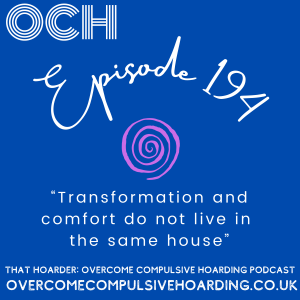
Friday Jul 11, 2025
Friday Jul 11, 2025
Come to a Dehoarding Accountability Zoom Session: http://www.overcomecompulsivehoarding.co.uk/ticket
Subscribe to the podcast: https://www.overcomecompulsivehoarding.co.uk/subscribe
Podcast show notes, links and transcript: http://www.overcomecompulsivehoarding.co.uk/
Transformation and comfort rarely go hand in hand, especially when it comes to overcoming compulsive hoarding.
In this episode, I talk honestly about why making real change means facing discomfort, based on a quote from Healing Justice London that “transformation and comfort do not live in the same house”.
I challenge us to identify the difference between familiarity and comfort, and share practical ways to push through those tough moments - because growth comes from getting a bit uncomfortable.
If you’re tired of mistaking chaos for comfort, this one’s for you.
“Transformation and comfort do not live in the same house” (Healing Justice London)
The universal truth behind the idea
The necessity of discomfort for real transformation
Discomfort Versus Comfort in the Hoarding Context
Familiarity as a source of “comfort” for those who hoard
Risks of equating familiarity with true comfort
The need for change and its inherent discomfort
Examples of positive outcomes after embracing discomfort
The Reality of Discomfort in Dehoarding
Emotional and physical challenges of dehoarding
Potential for overwhelming feelings and anxiety
Catastrophising and perfectionism surrounding decision-making
Emotional toll of letting go and possible identity implications
Acknowledgement that discomfort does not mean failure
Familiarity Versus Authentic Comfort
Distinction between feeling comfortable and something being familiar
The false sense of control and security provided by clutter
The actual consequences of living in a hoarded home:
Physical hazards (tripping, blocked access, risk in emergencies)
Social isolation and shame
Lack of practical comfort (e.g., not sleeping in one’s own bed)
The hidden, ongoing “slow burn” of stress and discomfort
Motivation and Community
Importance of recognising the true discomfort of living with hoarding
Community connections via the podcast and accountability Zoom sessions
Methods to share resources and reduce isolation
Reframing Discomfort as Growth
Viewing discomfort as a sign of progress rather than a warning
The parallel discomforts of both dehoarding and continuing to hoard
Making conscious choices between competing difficulties
Strategies for Managing Discomfort
Taking small, manageable steps to build resilience
Being gentle and compassionate with oneself during the process
Reaching out for support (friends, family, therapist, peer groups)
The use and benefit of accountability sessions
The Broader Benefits of Transformation
Improved physical space and wellbeing
Increased self-confidence and pride
Better relationships and decreased shame
Regaining practical functionality and freedom at home
Enhanced overall quality of life
Practical Suggestions and Further Resources
Trying a small, uncomfortable but positive task today
References to previous episodes for deeper exploration:
Sitting with discomfort and distress tolerance (Episode 49)
Building resilience (Episode 70 with Dr. Jan Eppingstall)
Links
Podcast ep 190: What if we forgive ourselves, but now we know better, we do better? Choosing compassion over shame in hoarding disorder
Podcast ep 49: Sitting with discomfort: distress tolerance and hoarding – How unconscious distress avoidance might be worsening your problems
Podcast ep 70: Resilience and hoarding with Dr Jan Eppingstall of Stuffology
Enough, the Podcast
Come to a Dehoarding Accountability Zoom session: Accountability Booking Form
Website: Overcome Compulsive Hoarding
Become a Dehoarding Darling
Submit a topic for the podcast to cover
Questions to ask when dehoarding: https://www.overcomecompulsivehoarding.co.uk/podquestions
Instagram: @thathoarderpodcast
Twitter: @ThatHoarder
Mastodon: @ThatHoarder@mastodon.online
TikTok: @thathoarderpodcast
Facebook: Overcome Compulsive Hoarding with That Hoarder
Pinterest: That Hoarder
YouTube: Overcome Compulsive Hoarding with That Hoarder
Reddit: Overcome Compulsive Hoarding with That Hoarder subreddit
Help out: Support this project
Sponsor the podcast
Subscribe to the podcast
Subscribe to the podcast here
Buy your copy of Everything You Need to Know About Hoarding by Dr Lynne Drummond at cambridge.org/EverythingHoarding, and get 20% off with the discount code HOARDING20. #ad
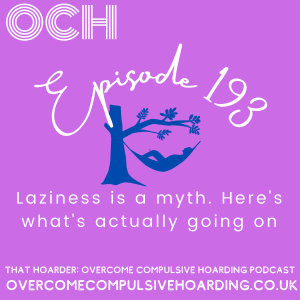
Friday Jul 04, 2025
Friday Jul 04, 2025
Come to a Dehoarding Accountability Zoom Session: http://www.overcomecompulsivehoarding.co.uk/ticket
Subscribe to the podcast: https://www.overcomecompulsivehoarding.co.uk/subscribe
Podcast show notes, links and transcript: http://www.overcomecompulsivehoarding.co.uk/
In this episode, I unpack the myth of laziness and why it’s such a damaging label for people with hoarding disorder.
I’ll break down how blaming ourselves or others for being “lazy” ignores the real barriers - like overwhelm, poor mental health, executive dysfunction and more - and just piles on more shame.
Let’s get honest about what’s actually holding us back and why reframing this idea matters.
The Myth of Laziness in Relation to Hoarding
Revisiting a previous episode’s question: Are hoarders lazy?
Arguments against the idea (hoarded homes require more energy to live in, etc.)
The aversion to external intervention reveals deeper issues than laziness
Societal attitudes towards rest and productivity
Internalised and external accusations of laziness
The damaging effects: shame, isolation, distress
Understanding Hoarding as a Mental Health Issue
Hoarding as a coping method for difficult emotions
Judgments of laziness overlook the disorder’s complexity and nuance
Such labels add barriers to seeking help and reinforce stigma
Consequences of Labelling People who Hoard (or Ourselves) as Lazy
Shame and self-criticism deepen the problem
Laziness as a simplistic explanation that ignores underlying issues
Possible root causes: executive dysfunction, decision-making difficulties, emotional attachment to items, avoidance, depression, physical disability, etc.
The Harmful Cultural Narrative Around Laziness
Societal pressures to be constantly productive
Inaccuracies of the “we all have the same 24 hours” myth
Differences in time and capability due to systemic inequalities
Examples: physical ability, mental health, neurodivergence, responsibilities, discrimination
Moral and Social Implications of the “Lazy” Label
Care tasks are morally neutral (reference to KC Davis, episode 82)
The negative cycle: shame leads to paralysis, makes it harder to seek help and make progress
Laziness label used as a justification for lack of societal support
Political and social consequences for marginalised groups
Importance of community, support, and helping each other
The Danger of Linking Self-Worth to Productivity
The toxic culture of non-stop productivity and hustling
Problems with feeling guilty for resting
The spiral of self-worth being tied to continuous output
The Limiting Nature of the Laziness Concept
It shuts down further exploration of underlying problems
Missed opportunities for self-compassion, empathy, and effective assistance
Underlying Reasons for Struggles That Are Mistaken for Laziness
Lack of motivation: exhaustion, depression, overwhelm
Overwhelm due to the scale of the task
Executive dysfunction (planning, initiating, processing tasks)
Fear (of the process, of making wrong decisions, of consequences)
Fatigue, burnout, and mental health struggles
Being practically or emotionally stuck, lacking skills or knowledge
Societal Structures and Individual Blame
Blame placed on individuals ignores wider systemic and commercial influences
Industries profit from reinforcing personal inadequacy (beauty industry analogy, storage solutions)
The cycle of self-blame, shame, and attempts to “fix” via consumerism
Breaking the Cycle and Moving Forward
Recognising the myth of laziness enables real progress
Compassion, curiosity, and support as healthier responses
Encouragement for self-acceptance and seeking genuine solutions
Buy your copy of Everything You Need to Know About Hoarding by Dr Lynne Drummond at cambridge.org/EverythingHoarding, and get 20% off with the discount code HOARDING20. #ad
Links
Podcast ep 57: Are hoarders lazy? I think you’d be surprised…
Podcast ep 82: Dehoarding when you’re drowning with KC Davis of Struggle Care
Podcast ep 112: Executive function, executive dysfunction and hoarding with Dr Jan Eppingstall
Podcast ep 186: 10 executive dysfunction tips and tricks to help people who hoard, whether we have ADHD or are neurodivergent or not – Hoarding Awareness Week 2025
Podcast ep 183: ADHD, executive dysfunction and creating hacks and systems to reduce clutter chaos, with Carrie Lagerstedt
Podcast ep 162: From Fibble to Focus: Defibble your executive dysfunction with Jo Cavalot
Podcast ep 188: 12 ways to make decision-making easier (and why people who hoard find it so hard to make decisions in the first place!)
Podcast ep 139: Chronic disorganisation with Jo Cooke of Hoarding Disorders UK
Podcast ep 107: Things that look like hoarding but aren’t: ADHD, depression, autism, OCD, OCPD and more
Enough, the Podcast
Come to a Dehoarding Accountability Zoom session: Accountability Booking Form
Website: Overcome Compulsive Hoarding
Become a Dehoarding Darling
Submit a topic for the podcast to cover
Questions to ask when dehoarding: https://www.overcomecompulsivehoarding.co.uk/podquestions
Instagram: @thathoarderpodcast
Twitter: @ThatHoarder
Mastodon: @ThatHoarder@mastodon.online
TikTok: @thathoarderpodcast
Facebook: Overcome Compulsive Hoarding with That Hoarder
Pinterest: That Hoarder
YouTube: Overcome Compulsive Hoarding with That Hoarder
Reddit: Overcome Compulsive Hoarding with That Hoarder subreddit
Help out: Support this project
Sponsor the podcast
Subscribe to the podcast
Subscribe to the podcast here
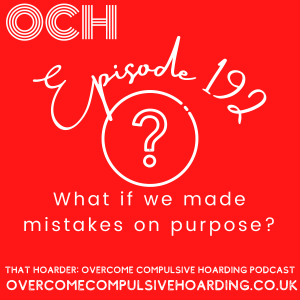
Friday Jun 27, 2025
Friday Jun 27, 2025
Come to a Dehoarding Accountability Zoom Session: http://www.overcomecompulsivehoarding.co.uk/ticket
Subscribe to the podcast: https://www.overcomecompulsivehoarding.co.uk/subscribe
Podcast show notes, links and transcript: http://www.overcomecompulsivehoarding.co.uk/
Today I’m talking about why letting yourself make mistakes - like running out of everyday items or doing things imperfectly - can actually help if you’re struggling with hoarding.
From challenging perfectionism to rethinking the fear of scarcity, I’ll share how embracing messiness can move us forward. Plus, I’ll offer practical ideas for easing those fears and making progress, one small, imperfect step at a time.
Announcement of new dates for Dehoarding Accountability Zoom Sessions.
Aimed at connecting people who hoard for conversation and simultaneous decluttering.
Details on how to get tickets and availability through several upcoming months.
The Value of Making Mistakes
Challenging the idea of perfection and fear of making mistakes.
Proposing the benefits of allowing oneself to:
Make more mistakes.
Run out of things occasionally.
Do things imperfectly or “half-arsed.”
Identifying how fear of mistakes and perfectionism can keep people stuck in hoarding behaviours.
Perfectionism and Fear of Scarcity
Perfectionism:
Fear of making the “wrong” decision leads to inaction or keeping everything.
Uncertainty about the future and anxiety about discarding items.
All-or-nothing thinking: If it can't be done perfectly, it’s not worth starting.
Personal reflection on the struggle with perfectionist tendencies.
Fear of Scarcity:
“Keep it just in case” mentality.
Stemming from past experiences of poverty or deprivation.
How personal history and upbringing foster scarcity-based behaviours.
Recognition that such fears can be irrational and still hold significant power.
How this fear leads to over-acquisition and reluctance to discard.
Addressing Perfectionism and Scarcity (Mindset Shifts)
Techniques to gently challenge perfectionism and scarcity fears.
Reframing mistakes as learning opportunities rather than failures.
Allowing for experimentation as a method of progress.
Embracing Mistakes as a Path Forward
Learning from mistakes as a source of growth and behaviour change.
Normalising occasional regrets over discarding or not acquiring something.
Comparing the cost of keeping everything versus the occasional “mistake.”
Observing emotional responses to mistakes as a way to learn and build decision-making confidence.
Encouragement to start with low-risk decisions and build up “dehoarding muscle” gradually.
Allowing Things to be Done Imperfectly
Encouragement to “do things badly” rather than waiting for perfect execution.
“Done is better than perfect” as a motivating principle.
The danger of all-or-nothing thinking leading to perpetual inaction.
Practical examples of doing small tasks imperfectly:
Tackling a small part of a larger problem (e.g., half a shelf).
Donating a partial bag of items.
Taking any step forward, even imperfect ones, counts as progress.
Allowing Yourself to Run Out of Things
Creative and resourceful solutions arise when supplies run low.
Examples from daily life (cooking, art journalling) where scarcity breeds creativity.
Differentiates between essential items and those where running out is an acceptable risk.
Suggestions for consciously assessing what’s truly necessary to keep in stock.
Experimental Mindset: Treating Dehoarding as Data Collection
Each decision - successful or not - provides valuable data for future choices.
Building confidence and capability for bigger, more challenging decluttering decisions over time.
Summary and Reinforcement of Key Points
Allow for imperfection, mistakes, and occasional scarcity.
Importance of starting with manageable steps and celebrating imperfect progress.
“Done is better than perfect”—taking action, however small, is crucial.
Buy your copy of Everything You Need to Know About Hoarding by Dr Lynne Drummond at cambridge.org/EverythingHoarding, and get 20% off with the discount code HOARDING20. #ad
Links
Come to a Dehoarding Accountability Zoom session: Accountability Booking Form
Website: Overcome Compulsive Hoarding
Become a Dehoarding Darling
Submit a topic for the podcast to cover
Questions to ask when dehoarding: https://www.overcomecompulsivehoarding.co.uk/podquestions
Instagram: @thathoarderpodcast
Twitter: @ThatHoarder
Mastodon: @ThatHoarder@mastodon.online
TikTok: @thathoarderpodcast
Facebook: Overcome Compulsive Hoarding with That Hoarder
Pinterest: That Hoarder
YouTube: Overcome Compulsive Hoarding with That Hoarder
Reddit: Overcome Compulsive Hoarding with That Hoarder subreddit
Help out: Support this project
Sponsor the podcast
Subscribe to the podcast
Subscribe to the podcast here
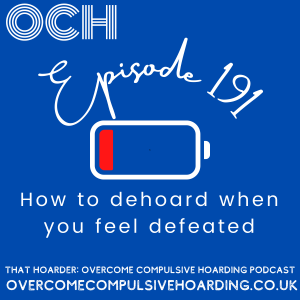
Friday Jun 20, 2025
Friday Jun 20, 2025
Come to a Dehoarding Accountability Zoom Session: http://www.overcomecompulsivehoarding.co.uk/ticket
Subscribe to the podcast: https://www.overcomecompulsivehoarding.co.uk/subscribe
Podcast show notes, links and transcript: http://www.overcomecompulsivehoarding.co.uk/
Feeling defeated by dehoarding? I’ve been there, and I’m trying to get out of it, so in this episode I unpack what’s really behind that sense of hopelessness, breaking it down into manageable pieces, and sharing practical steps for moving forward - even when it all feels impossible. If you’re stuck, overwhelmed, or just too tired to start, you’re not alone. So let’s talk about some concrete things you can try.
Buy your copy of Everything You Need to Know About Hoarding by Dr Lynne Drummond at cambridge.org/EverythingHoarding, and get 20% off with the discount code HOARDING20. #ad
Feeling Defeated by Dehoarding
Host’s recent struggle with feeling defeated and hopeless
Common reasons for feeling defeated:
The enormity of the task
Personal life challenges and lack of time
Breaking down what “defeated” means for individuals
Self-Reflection and Identifying Obstacles
Using self-questioning techniques inspired by CBT
Listing and mapping out the causes of defeat on paper
Examples of personal obstacles:
Fatigue and physical health
Difficulty concentrating
Emotional overwhelm and stress
Shame and self-blame
Sense of impossibility
Breaking Down Barriers and Theme Identification
Categorising specific reasons for defeat
Writing actionable notes beside each challenge
Strategies for managing each obstacle:
Sleep hygiene and physical health maintenance
Working on self-compassion and challenging self-blame
Supporting concentration and mental health through self-care
Trial and error with productivity and to-do lists
Coping with Overwhelm
Recognising overwhelm as a rational but paralysing response
Techniques for reducing overwhelm:
Breaking tasks into tiny, actionable steps
Focusing on achievable mini-goals
Reframing "impossible" goals into manageable actions
Addressing Stress
How personal and environmental stress feeds into defeat
Practical strategies:
Tackling smaller, actionable tasks to relieve work/personal stress
Honest communication with peers, family, and colleagues about overwhelm
Accepting that some sources of stress require long-term coping rather than immediate solutions
Tackling the Sense of Impossibility
Recognising the vagueness of the feeling
Returning to self-analysis to clarify what specifically feels impossible
Using accumulated small improvements to chip away at the larger sense of defeat
Dealing with Overwhelm and Taking Breaks
Granting oneself intentional breaks to refresh perspective without guilt
Comparing dehoarding effort to the need for breaks in work life
Re-evaluating Plans and Expectations
Assessing the effectiveness of current strategies and goals
Adapting goals to current capacity and circumstances
Seeking external feedback and community support
The Importance of Support Systems
Nurturing and expanding support from peers, professionals, and loved ones
Recognising where additional support is needed
Celebrating Small Wins
The importance of acknowledging tiny victories
Suggestions for gentle self-recognition and reward
Recording achievements for self-motivation
Links
Podcast ep 190: What if we forgive ourselves, but now we know better, we do better? Choosing compassion over shame in hoarding disorder
Podcast episode 174: How to feel grounded when we’re overwhelmed or dysregulated using ventral vagal spaces and touchstones, with Dr Jan Eppingstall
Podcast ep 160: Dehoarding with the seasons: get inspired by nature when everything is overwhelming
Podcast ep 16: Dealing with overwhelm
Podcast ep 127: Overcoming overspending with Paige Pritchard, Money Coach
Financial Confessions podcast
Come to a Dehoarding Accountability Zoom session: Accountability Booking Form
Website: Overcome Compulsive Hoarding
Become a Dehoarding Darling
Submit a topic for the podcast to cover
Questions to ask when dehoarding: https://www.overcomecompulsivehoarding.co.uk/podquestions
Instagram: @thathoarderpodcast
Twitter: @ThatHoarder
Mastodon: @ThatHoarder@mastodon.online
TikTok: @thathoarderpodcast
Facebook: Overcome Compulsive Hoarding with That Hoarder
Pinterest: That Hoarder
YouTube: Overcome Compulsive Hoarding with That Hoarder
Reddit: Overcome Compulsive Hoarding with That Hoarder subreddit
Help out: Support this project
Sponsor the podcast
Subscribe to the podcast
Subscribe to the podcast here
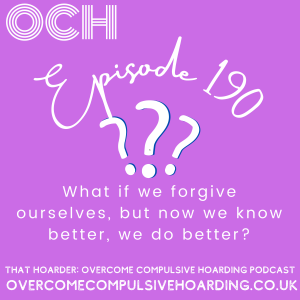
Friday Jun 13, 2025
Friday Jun 13, 2025
Come to a Dehoarding Accountability Zoom Session: http://www.overcomecompulsivehoarding.co.uk/ticket
Subscribe to the podcast: https://www.overcomecompulsivehoarding.co.uk/subscribe
Podcast show notes, links and transcript: http://www.overcomecompulsivehoarding.co.uk/
Today I’m looking at what happens if we forgive ourselves for past hoarding behaviours, why we maybe should, and how we can actually use that insight to make better choices and move forward. I talk honestly about the shame and guilt that keeps so many of us stuck. There’s some reflection on the roots of hoarding, the importance of self-compassion, and why hating ourselves into action just doesn’t work - plus a few practical suggestions for anyone trying to make a change, no matter where you’re starting from.
Buy your copy of Everything You Need to Know About Hoarding by Dr Lynne Drummond at cambridge.org/EverythingHoarding, and get 20% off with the discount code HOARDING20. #ad
Forgiving Ourselves but Doing Better
Exploration of guilt and shame related to hoarding and feeling overwhelmed.
Reflection on self-blame, regret, and paralysis it can cause.
Catholic upbringing: Confession, forgiveness, and the importance of genuine intent to change.
Recognition that hoarding often stems from trauma, loss, fear, anxiety, or neurodivergence.
Discussion of cause and effect - influences behind hoarding behavior.
Emphasis that hoarders are not lazy or bad people, but in a complex situation.
The cycle of self-judgement and the importance of self-compassion as an antidote to shame.
Practical advice: Treat oneself with the compassion you’d offer others, challenging negative self-talk.
How self-criticism can demotivate and hinder progress.
Comparison: Encouraging someone else is more effective than berating oneself.
Understanding mistakes, taking responsibility, and making amends when possible.
The importance of learning from past experiences and committing to doing better.
Practical Strategies for Moving Forward
Suggestions for emotional and action-oriented progress:
Journalling or talking to someone about feelings.
Looking back with compassion to identify patterns and triggers.
Start dehoarding by breaking tasks into small steps.
Avoiding perfectionism; celebrating any progress.
Reference to "towards and away moves" from episode 182 with Dr. Jan Eppingstall.
Identifying values and making choices that align with them.
Finding support from therapists, friends, family, support groups, or accountability sessions.
Acknowledgement that forgiving oneself is challenging but necessary for progress.
Emphasising persistence, compassion, and learning from mistakes.
Encouragement and Validation
Recognition of listeners at various stages of their journey - starting, struggling, making progress, or just listening for now.
Assurance that small steps count and everyone is doing their best.
Emphasis that listeners are not alone.
Links
Podcast ep 181: Past influences and future possibilities: cause and effect and hoarding disorder (plus Podcasthon)
Podcast ep 95: Shame and hoarding with Professor Luna Dolezal
Podcast ep 182: What are “towards and away moves” and what on earth do they have to do with hoarding recovery? With Dr Jan Eppingstall
The Gray Area podcast
Come to a Dehoarding Accountability Zoom session: Accountability Booking Form
Website: Overcome Compulsive Hoarding
Become a Dehoarding Darling
Submit a topic for the podcast to cover
Questions to ask when dehoarding: https://www.overcomecompulsivehoarding.co.uk/podquestions
Instagram: @thathoarderpodcast
Twitter: @ThatHoarder
Mastodon: @ThatHoarder@mastodon.online
TikTok: @thathoarderpodcast
Facebook: Overcome Compulsive Hoarding with That Hoarder
Pinterest: That Hoarder
YouTube: Overcome Compulsive Hoarding with That Hoarder
Reddit: Overcome Compulsive Hoarding with That Hoarder subreddit
Help out: Support this project
Sponsor the podcast
Subscribe to the podcast
Subscribe to the podcast here









